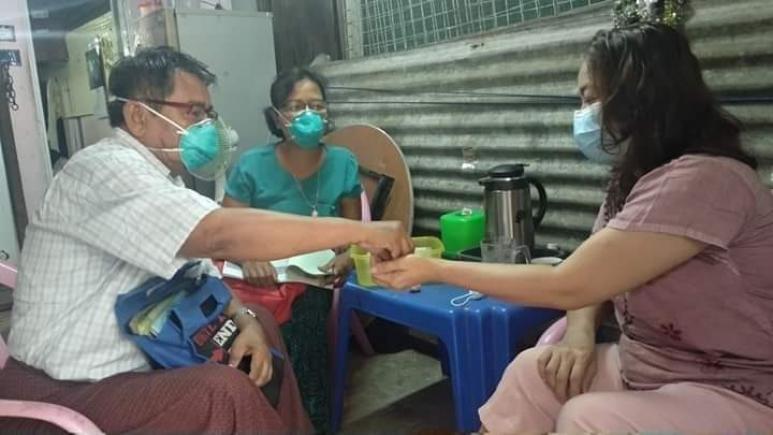If it had not been for the help of Pyi Gyi Khin’s volunteers, I don’t know if I could have completed the long MDR-TB treatment. They really cheered me up and took care of my treatment and follow-up.”
In February 2018, Daw Naw Ro Da noticed that she had started to cough and have fever every evening. She thought it was because of her heavy workload in her job as a house maid. First, she went to her local GP clinic, and although the treatment she got there gave some short-term relief, her severe cough came back and she was losing weight. She felt weakened and was unable to continue to work. After one month, her GP referred her to the local Rural Health Centre in Mayangone Township for further tests. There, she provided a sputum sample which was checked in the Health Centre and sent to Aung San Hospital for GeneXpert testing.
Naw Ro Da was shocked when she got the result back from Aung San Hospital. It said that she had multidrug-resistant tuberculosis (MDR-TB). She had never heard of MDR-TB before. She would need to take treatment for 20 months, including a course of injections for the first 6–8 months.
With her family’s support, she started the treatment in April 2018. Unfortunately, she experienced side effects from the injections—made worse because she also has diabetes mellitus—which included difficulty to walk immediately after the injection, and so the midwife started to come to give her the injections at home. After one month, she felt that she could no longer bear the side effects from the injections, and told the midwife she wanted to stop the treatment. The midwife explained that if she stopped, they would need to report that to the authorities and she would no longer be able to stay in her home.
“The midwife asked me to think about my kids’ future, and after discussing some more with her, I decided to continue the treatment, as I did not want to transmit the infection to my family,” explained Naw Ro Da.
“After two months, two persons came along with the midwife on the home visit. They introduced themselves as Pyi Gyi Khin (PGK) volunteer monitor Daw Aye Aye Myint and volunteer U Myint Thein, and said that they would help me to take my treatment regularly and on time. Daw Aye Aye Myint, told me that PGK was funded by the Global Fund and they provide financial support for patients of 30,000 kyat for the follow-up visit and 28,000 kyat for nutrition, as well as also providing a handkerchief, a mug with lid to collect sputum, and face masks.”
The PGK monitor and volunteers supported Naw Ro Da through directly observed treatment (DOT) every day, checked on side effects, supported sputum testing of the whole family, and taught her about MDR-TB and how to control its spread. “They also said I should drink plenty of water, get enough sleep, eat well and—most importantly—take the treatment regularly at the correct dose and time. I needed to stay separately within my family at that time, and in an open and airy place. I had to cover my face when talking to others until my course of injections was complete, and I needed to avoid crowded places to prevent transmission,” continued Naw Ro Da.
“While I was getting the injections, I suffered nausea and vomiting every time I took the drugs. If it had not been for the help of PGK’s monitor and volunteer, I don’t know if I could have completed the eight months of injections. They really cheered me up and took care of my treatment and follow-up.”
The good news is that, once the course of injections was finished, the side effects stopped and Naw Ro Da was able to eat well again. On 30 December 2019, she was told that her treatment was completed and that it had been a success. Her family’s sputum tests were also clear.
“I am regaining weight slowly, my skin is improving and I am getting my good looks back! For others who have this disease, I want them to know that it can be cured by taking treatment regularly and completing the full course, along with the support and care of doctors, midwives and volunteers. There is hope.”
Pyi Gyi Khin has been implementing its Global Fund supported MDR-TB project, ‘Patient centered community based MDR-TB care model’ since 2018 in 21 townships in Yangon, with the aim of supporting treatment success in MDR-TB patients while ensuring infection control and a standard package of support with the close collaboration of the National Tuberculosis Programme.
From The Global Fund UNOPS Myanmar page
https://pr-myanmar.org/en/news/getting-back-health-journey-mdr-tb-patient-0
Credit#The Global Fund UNOPS Myanmar orginal page#
News Categories:
- Success Story


